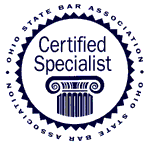Workmans Compensation FAQ
-
The Industrial Commission of Ohio issues the final decision as to the injured worker’s claim. If the claim is denied, you have the right to file an appeal to the Court of Common Pleas, and the injured worker bears the burden of his or her right to participate in the workers’ compensation fund.
A worker may also have the option to file a lawsuit regarding issues with the “extent of disability,” and in these cases he or she must establish that the Industrial Commission of Ohio “abused its discretion. ”
In all cases, it is advisable for an injured worker to consult with an experienced workers’ compensation attorney such as John C. Bucalo. The initial consultation is free. Call 216.344.9100.
-
You only have a specific time period in which to file a workers’ comp claim. You must file all claim applications within one or two years, depending of the date of injury. The statute of limitations on filing an occupational disease claim is two years after the disability due to the disease began, six months after the date of diagnosis by a physician or two years after a death due to the disease.
Note that if your claim is dismissed, and you file a new claim, the new filing date does not change the statute of limitations.
-
How does an injured worker in Ohio report his or her injury or occupational disease to the employer?
Not all injuries occur due to a sudden accident _ some occur over time. After you have been injured or received a medical diagnosis, you should notify your employer immediately and fill out a report.
Report the injury to your supervisor in writing and include the following information:
-
the time and date of the injury
-
a brief description of events surrounding the injury
-
a full list of the body parts injured as a result of the accident
Also, inform your co-workers of the injury and determine whether anyone else was a witness to the events leading to the injury.
-
SSD & SSI Claims FAQ
-
In order to qualify for Social Security Disability (SSD) benefits, an individual must have worked long enough in a job or jobs covered by Social Security — typically 10 years. In addition, the individual must have a medical condition that meets Social Security’s definition of disability — typically those who have been unable to work for a year or more or who have a condition expected to end in death.
-
In order to qualify for Supplemental Security Income (SSI) benefits, the individual must be aged 65 or older, blind or disabled, and have limited income and limited resources. In addition, an individual can apply for SSI benefits for a child who has a physical or mental condition that very seriously limits his or her activities, and the condition must have lasted or be expected to last at least one year or result in death.
-
Typically, the majority of SSD and SSI claims are denied at the initial claim and reconsideration levels. At that point, SSD and SSI claims would need to go to a hearing in front of an administrative law judge. An SSD/SSI attorney who has a depth of knowledge and familiarity with Social Security rules and regulations knows how to properly and thoroughly prepare an SSD or SSI case for a hearing.
Don’t lose your opportunity to win disability benefits. Consult with experienced SSD/SSI attorney John C. Bucalo today. The initial consultation is free. Call 216.344.9100.
Personal Injury FAQ
-
The first thing to do is to determine if there are any injuries. If the accident is minor, do not simply settle with the driver without calling law enforcement — you or a passenger may have suffered injuries you are not yet aware of.
If the accident involves any injury at all, even a minor one, call the police and for medical assistance. This provides proof of the accident and an immediate investigation of the scene. Once everyone is out of danger, and 911 has been called, get the following information from the other driver(s): name(s); license number, address(es) and phone number(s); driver’s insurance company and policy number; license plate number and description of all cars involved; registered owners’ names and addresses of all vehicles involved. In addition get the names, addresses and phone numbers of occupants in the cars involved, as well as any pedestrians or witnesses. And get the responding offer’s name, department and badge number.
-
Always remember that insurance companies want to minimize payouts, and their goal is to pay you as little as possible. Claims adjusters are often rewarded for resolving claims quickly and for as little as possible.
You do not have to make a quick decision and accept an insurance company’s payout. In addition, you do not have to provide information to the insurance company without first getting legal advice. If the insurance company is asking you to make a recorded statement about the accident, it is wise to consult with an expert personal injury attorney such as John C. Bucalo before doing so.
There are many different scenarios in which an injured party may have a legal claim. Every situation is fact-specific, which is why you should visit an expert personal injury attorney such as John C. Bucalo and explain your situation and find out how the law applies in your specific case. The initial consultation is free. Call 216.344.9100.


